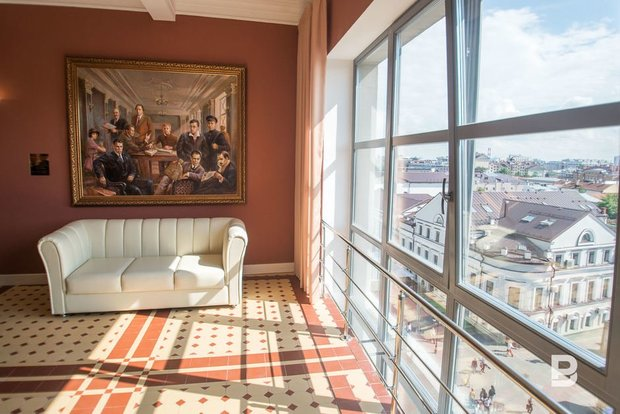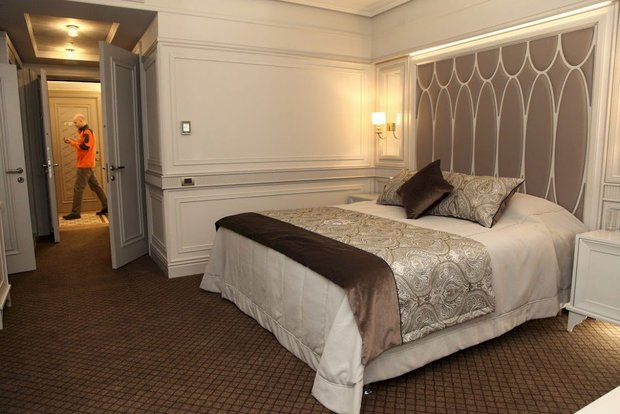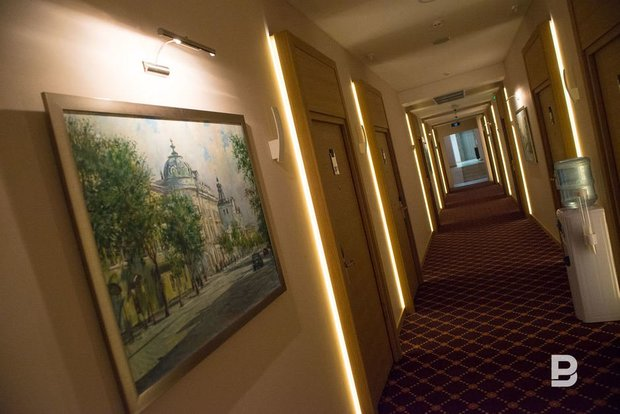Kazan in top 5 cities for hotel business, but hoteliers disagree
Kazan is in the top 5 Russian cities leading hotel operators are very interested in. A study became a reason to talk about the situation in the sector. President of the Association of Hoteliers of Tatarstan Gulnara Safina noted growing inflation and its consequences, which eat up business incomes. Head of Tourism and Hospitality Union centre for strategic development Roman Yeremyan calculated that the key figure used in the hospitality industry — revenue per available room — has decreased by more than a quarter in Kazan. Read more in Realnoe Vremya’s report.
Two positions up in a year
Kazan occupied the honourable 4th position in a rating of the most attractive Russian cities for the hotel business. Only Saint Petersburg, Moscow and Sochi are ahead. Compared to last year’s result, it is two positions up and is in the top 5. Cushman & Wakefield surveyed the largest international and Russian hotel chains that actively develop in the country or plan to enter the Russian market. Analysts of the company have done the survey for the second time: in November 2021, respondents evaluated the attractiveness of the opening of new hotel chains in 20 Russian cities on a scale from 1 (not interesting) to 10 (very interesting). Cities from the top 5 got average points from 8 to 10. So the hoteliers’ interest in Kazan rose from 7,8 in 2020 to 8,4 in 2021.
The first three cities that are more promising to open new hotels didn’t change, it is still Moscow, Saint Petersburg and Sochi. The only difference is that Moscow and Saint Petersburg swap their places.
The researchers stress that a considerable fall of some city doesn’t mean hotel operators aren’t interested in them. One of the reasons for such a situation can be a saturated market with announced or constructed hotel projects like in Omsk (-6 positions). In other words, there is already the necessary amount of projects, and the needs for a big amount of additional rooms aren’t yet seen.

Return to pre-pandemic figures expected by 2023
Hotel operators also analysed the current state of their projects:
- 67% of the respondents called financing problems (their own money or borrowings) as the main reason for the cancellation or delayed projects;
- 40% of the respondents claimed the launch of hotels can be 6-12 months late because of the coronavirus pandemic;
- 43% of operators include ESG principles into contracts.
Also, the authors of the rating asked operators when they expected the RevPAR to return to its level in 2019. Amid the current low demand caused by the pandemic can be considered as a perfect period.
No operator forecasts the situation will improve in 2022 in regional markets, including Kazan. Moreover, 73% still expect the value of rooms will recover in 2023, 27% do in 2024.
The data on Moscow is more optimistic, most respondents — 73% — think this will happen in 2023, 18% of surveyed operators hope for 2024 and only 9% said 2022. At the same time, the average income of the hotel room in 11 months of 2021 compared to the same period in 2021 rose by 94% and was 3,833 rubles. However, it is still 27% lower than during the same period before COVID-19 in 2019, reads the analytic report for Q42021.

“The August factor worked”
Realnoe Vremya asked experts of the industry if they agreed with such an evaluation, if the market capacity in Kazan was enough to open new hotels.

“When chain operators choose a location, first of all, they want a city with a population over a million people. In this sense, Kazan certainly fits. Secondly, events. Here, we are also in the top: it is different international and sports events. We have one of the best sports infrastructure in the country, quality hospitality infrastructure, including the hotel capacity, public catering considering that we have hosted the Universiade, FIFA World Cup and so on. We have one of the most prepared urban infrastructures,” the speaker stressed.
Safina paid attention to the fact that despite the presence of international hotel chains in the city Accor (Ibis), Wyndham (Ramada), Hilton, Marriott and others, the hotel infrastructure continues growing. Particularly KRAVT HOTEL at the Kazan airport will open soon, the construction of two hotels instead of Riviera entertainment complex, which was demolished, and near the Aquatics Palace in tandem with a new medical centre were announced, not to mentioned the appearance of smaller hotels.
“Kazan is suitable for international operators to run a business in many parameters. This is why it is in the top, and I think we will stay there,” the head of the Association agreed with the results of the survey.
As for the recovery of profitability to its pre-pandemic level, the head of the Association noted that some Kazan hotels ended the year with the best financial indicators than in 2019. And this happened amid a fall in tourist traffic.
“Revenue was bigger, there were fewer guests. But here the August factor worked when all the borders were closed. People who didn’t manage to go to Crimea and Krasnodar Krai because of overcrowded hotels went to other attractive regions such as Tatarstan. The occupancy rate in the sector reached 85-90%. This was never seen. But this isn’t a fixed tendency, it is, so to speak, “seam allowance.”
Safina stressed that the financial success of some Kazan hotels cannot be extrapolated for the whole sector. Also, growing inflation and its consequences that eat up all business incomes make themselves known.
“If earlier when buying products we correlated prices once in a quarter, now we have to reconsider them once in a month. Prices for some products rose by 10%. Interregional competition encourages higher salaries for staff, consequently, transfers in the payroll fund grow, nobody cancelled utility bills, payment for rubbish removal, taxes and so on.”

Chain operators’ opinion isn’t investors’ opinion

“This study doesn’t say how many companies participated in it, consequently, how many hotel rooms in the Russian Federation they have at their disposal. Neither is it said that the managing companies themselves aren’t investors, they manage others’ hotels somebody invested in. At the same time, the reward of management companies is transferred from revenue, not income. Even if an investor has operational losses, the management company anyway has to be paid some per cent of the revenue. It is a very important detail. This is why it is necessary to understand that, firstly, the evaluation isn’t unbiased. Secondly, the method describes that the respondents put marks saying if this was interesting or was not interesting for them. Then a question arises: ‘What does interesting mean?’”
Roman Yeremyan explained that the key indicator in the hotel business was the revenue per available room. RevPAR is calculated by dividing all incomes by 365 days and dividing the number of rooms.
“I spent time and had a look at the database of the Russian Statistics Service and compared this indicator in Tatarstan in rubles in 2018-2021 and converted it in dollars. When we say Tatarstan, we mean Kazan. And what we see: the average income per room in 2017 was 1,334 rubles ($22,6), 1,222 rubles ($16,5) in 2021. A fall is noticeable even without inflation. Whereas investors calculate their investments in dollars, rubles work only to pay for utility bills and taxes. I don’t want to downplay the merits of Tatarstan, but it is the numbers published in the unified information statistics system. It is impossible to disagree with it, it is objective data. And then everybody should decide oneself if they are interested in investing in such a market where the revenue per room available has decreased by almost a quarter in the last five years.”

The expert stressed that the opinion of chain operators isn’t investors’ opinion who themselves make a decision to open a business in a new location.
“I don’t understand the sense of this research. The real indicator is either money in the money box like revenue or money like investments. The rest is just doubletalk, especially in management companies. The world’s five management companies manage 5,5 million rooms, it is 20% of the global room number. Due to this, they own less than 1%, the rest is others’ assets. Therefore they said it was interesting, it doesn’t mean they will hurry to invest.”